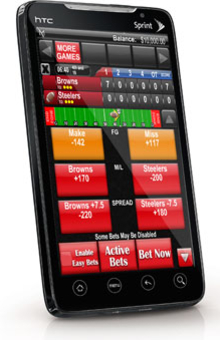In late 2010, I began talking to a very early-stage startup named Slipjockey, based in Salt Lake City. When we first started corresponding, Slipjockey was little more than a good idea coupled with some very basic technology and passionate co-founders. In the time since, Slipjockey has taken appropriate steps to bring their concept to market, including securing a favorable legal opinion and filing a patent for their technology.
The core concept of Slipjockey is ingenious. It’s a marketplace for buying and selling Las Vegas bet slips. The process starts when someone makes a bet at a licensed Nevada race and sports book. If he or she wants to sell the bet slip for whatever reason — suppose the predicted team is winning in a landslide at halftime and the slip has doubled in value — they can log onto Slipjockey and list it for sale. Another Slipjockey user may agree to buy it. The buyer takes ownership of the bet slip and he or she can keep it or resell it again to another Slipjockey user, etc. The final owner of any bet slip is paid in full directly from the sports book that originally issued the ticket.
Real-time trading on Slipjockey is similar to the action on betting exchanges like Betfair. The key difference is that all wagers must originate from a licensed Nevada race and sports book where gambling is legal.
The Slipjockey business concept grew from the notion that handicappers should have an option other that win, lose, or push. Slipjockey provides that fourth option by enabling handicappers to terminate their outcome risk, locking in a gain or avoiding a total loss prior to the end of the event. With the growth in live betting (aka “in-running betting”) around the world, and in Las Vegas courtesy of Cantor Fitzgerald, it’s clearly an option that people want.
Initially, Slipjockey is focused on launching with coverage of US football, tennis, and golf before expanding into other sports.
I’ve spoken mainly with Ryan Eads and his brother Rory, two of the co-founders. They are smart, well spoken, and tireless entrepreneurs. I have every expectation that, to the extent this idea has wings — and I believe it does — they will make it fly.
The first question you’re likely to ask is: is this legal? Indeed, that’s the first question I asked Ryan. As a pre-condition to launching, he secured a legal opinion from a former Nevada Gaming Control Board attorney that says, in effect, that because bets originate in Las Vegas and are ultimately paid out in Las Vegas, the Slipjockey exchange is legal. The attorney’s opinion is just that: an opinion, and not a guarantee. But it is convincing and credible. Certainly Slipjockey users are safe.
Currently, Slipjockey is inviting users to participate in a soft launch for trading National Football League games. To participate, create a profile at www.slipjockey.com and send an email to info@slipjockey.com. Mention that you read my blog post and I’m sure they’ll send you an invitation containing all the details if they have spots remaining.
